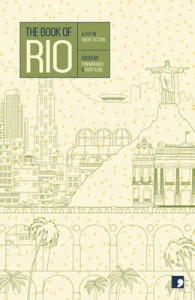 Published by Comma Press 4 June 2014
Published by Comma Press 4 June 2014
paperback, £9.99
Reviewed by Zoë Fairbairns
Football on television is usually a signal for me to go and wash my hair, but during this year’s World Cup I’ve had other distractions: a collection of short stories about things that go on in Rio de Janeiro that don’t involve 22 grown men trying to kick a ball into a net.
Stories in The Book of Rio pulsate with music and sex, ache with fatigue and yearning, flicker with the occult, crackle with danger. In ‘I Love You’ by Patricia Melo, a female student working as an escort is much more interested in texting her friends who have gone clubbing without her than in paying attention to her client, who has his own plans for what he wants her to do for him this evening. In ‘Strangers’ by Sergio Sant’Anna, two flat-hunters – a man and a woman who don’t know each other – arrive simultaneously to view what seems like a desirable property, but which turns out to be riddled with bullet holes following a recent gunfight in the nearby favela. In ‘The Biggest Bridge in the World’ by Domingos Pellegrini, workers under pressure to get the eponymous bridge built on time, keep themselves awake by tipping buckets of cold water over themselves – not such a good idea if, like the story’s narrator, you are an electrician.
The electrician muses on why the bridge needs to be built at all – ‘At night I’d look at Rio and then at Niteroi and I kept asking why do the people over there need to come over here, and why do the ones over here need to go over there?’ Different versions of the same question recur in other stories as characters in this restless city yearn to be anywhere other than where they are now. In ‘Spare Me, Copacabana!’ by Cesar Cardoso, the overdressed, self-dramatizing narrator waits impatiently to be escorted to a fashionable nightclub, only to discover that it has burnt down. In ‘Places, in the Middle of Everything’ by Elvira Vigna, a couple for whom Rio is their home city nevertheless seek out hotels for sex because they ‘fancied a change of bed’. In ‘The Woman Who Slept with a Horse’ by Joao Ximenes Braga, a woman with a successful career but no lover ‘wanted to be everywhere because she never wanted to be anywhere. She especially did not want to be at home.’
Another kind of disorientation awaits the reader who, never having been to Rio, tries to make use of the maps which interleave the stories, to locate them. Of course it is not the job of a book of stories to be a tour guide, and Toni Marques’s introduction provides a few clues about the geography of the city and the book’s fictional events. But the maps are so faintly printed and so lacking in the sort of information that you would expect – street names, landmarks, indicators of direction – that sometimes you feel that, like some of the lost souls in these fine stories, you could be anywhere.
